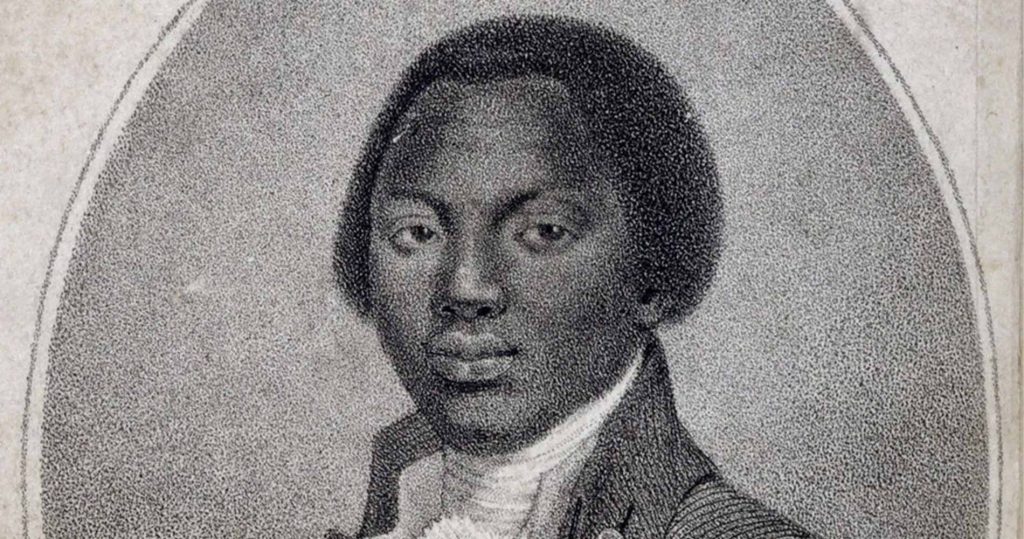Sidebar
Olaudah Equiano

The British Library
Olaudah Equiano’s autobiography, The Interesting Narrative of the Life of Olaudah Equiano, is a firsthand account of the Transatlantic Slave Trade that provides a critical perspective into the horrors of trafficking.
Olaudah was 11 years old when he and his sister were kidnapped from their home in the Eboe region of the Kingdom of Benin (likely, modern-day Nigeria) while their parents worked in the field.1 Olaudah Equiano, The Interesting Narrative of the Life of Olaudah Equiano, or Gustavus Vassa, the African, vol. I (London, 1789) 4-5, 48-49. Separated from his sister, he was trafficked over many months through various households before eventually being taken to the ocean and forced to board a docked slave ship.2 Equiano, Interesting Narrative, 49-71.
Overwhelmed with terror, Olaudah was placed below decks, where he was knocked back by the crying of his fellow captives and “the loathsomeness of the stench,” which made it impossible to eat anything. When he refused food from the slave traders, they violently flogged him.3 Equiano, Interesting Narrative, 73-74. Olaudah witnessed repeated “brutal cruelty” from the slave traders, including hourly whippings for anyone who refused to eat.4 Equiano, Interesting Narrative, 73-75.
When the slave ship set sail for Barbados, Olaudah spent weeks below decks.
The closeness of the place, and the heat of the climate, added to the number in the ship, which was so crowded that each had scarcely room to turn himself, almost suffocated us. This produced copious perspirations, so that the air soon became unfit for respiration, from a variety of loathsome smells, and brought on a sickness among the slaves, of which many died, thus falling victims to the improvident avarice, as I may call it, of their purchasers.
This wretched situation was again aggravated by the galling of the chains, now become insupportable; and the filth of the necessary tubs, into which the children often fell, and were almost suffocated. The shrieks of the women, and the groans of the dying, rendered the whole a scene of horror almost inconceivable.5 Equiano, Interesting Narrative, 78-80.
Olaudah details an incident when, having caught fish for themselves, the white traffickers threw the extra fish they did not eat overboard, rather than give it to the kidnapped Africans.6 Equiano, Interesting Narrative, 80-81.
He witnessed at least three kidnapped Africans attempt suicide by trying to jump off the ship and drown in the ocean rather than be subjected to a life of enslavement. One of the three men was caught and whipped “unmercifully.”7 Equiano, Interesting Narrative, 81-82.
After weeks at sea, the ship arrived in Barbados, where Olaudah and the other captives were taken to a “merchant’s yard, where we were all pent up together like so many sheep in a fold, without regard to sex or age.”8 Equiano, Interesting Narrative, 83-85. He was held there a few days before seeing buyers “rush” into the yard and grab the enslaved people they wanted to purchase, tearing apart families and loved ones who had survived the Middle Passage together.9 Equiano, Interesting Narrative, 86-87. Olaudah wrote:
I remember in the vessel in which I was brought over, in the men’s apartment, there were several brothers, who, in the sale, were sold in different lots; and it was very moving on this occasion to see and hear their cries at parting. O, ye nominal Christians! might not an African ask you, learned you this from your God, who says unto you, Do unto all men as you would men should do unto you?
Is it not enough that we are torn from our country and friends to toil for your luxury and lust of gain? Must every tender feeling be likewise sacrificed to your avarice? Are the dearest friends and relations, now rendered more dear by their separation from their kindred, still to be parted from each other, and thus prevented from cheering the gloom of slavery with the small comfort of being together and mingling their sufferings and sorrows? Why are parents to lose their children, brothers their sisters, or husbands their wives? Surely this is a new refinement in cruelty, which, while it has no advantage to atone for it, thus aggravates distress, and adds fresh horrors even to the wretchedness of slavery.10 Equiano, Interesting Narrative, 86-88.
Along with other kidnapped Africans from the same ship, Olaudah was not sold in Barbados. They were held on the island for several days, and then transported to Virginia, where they were sold into slavery.11 Equiano, Interesting Narrative, 90-94.
Years later, in 1766, while enslaved by Robert King, a Quaker living in Montserrat, Olaudah Equiano purchased his freedom for 40 British pounds. He eventually moved to London and joined the abolitionist movement.12 Olaudah Equiano, The Interesting Narrative of the Life of Olaudah Equiano, or Gustavus Vassa, the African,vol. II (Cambridge University Press, Reprint Edition, 2013), 11-19.